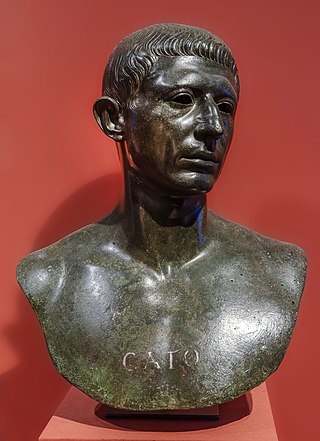
Lucius Sergius Catilina, known in English as Catiline, was a Roman politician and soldier, best known for instigating the Catilinarian conspiracy, a failed attempt to violently seize control of the Roman state in 63 BC.
Aulus Gabinius was a politician and general of the Roman Republic. He had an important career, culminating with a consulship in 58 BC, mainly thanks to the patronage of Pompey. His name is mostly associated with the lex Gabinia, a law he passed as tribune of the plebs in 67 BC that granted Pompey an extraordinary command in the Mediterranean Sea to fight the pirates.

Marcus Porcius CatoUticensis, also known as Cato the Younger, was an influential conservative Roman senator during the late Republic. His conservative principles were focused on the preservation of what he saw as old Roman values in decline. A noted orator and a follower of Stoicism, his scrupulous honesty and professed respect for tradition gave him a powerful political following which he mobilised against powerful generals of his day.

The gens Cassia was a Roman family of great antiquity. The earliest members of this gens appearing in history may have been patrician, but all those appearing in later times were plebeians. The first of the Cassii to obtain the consulship was Spurius Cassius Vecellinus, in 502 BC. He proposed the first agrarian law, for which he was charged with aspiring to make himself king, and put to death by the patrician nobility. The Cassii were amongst the most prominent families of the later Republic, and they frequently held high office, lasting well into imperial times. Among their namesakes are the Via Cassia, the road to Arretium, and the village of Cassianum Hirpinum, originally an estate belonging to one of this family in the country of the Hirpini.

The gens Licinia was a celebrated plebeian family at ancient Rome, which appears from the earliest days of the Republic until imperial times, and which eventually obtained the imperial dignity. The first of the gens to obtain the consulship was Gaius Licinius Calvus Stolo, who, as tribune of the plebs from 376 to 367 BC, prevented the election of any of the annual magistrates, until the patricians acquiesced to the passage of the lex Licinia Sextia, or Licinian Rogations. This law, named for Licinius and his colleague, Lucius Sextius, opened the consulship for the first time to the plebeians. Licinius himself was subsequently elected consul in 364 and 361 BC, and from this time, the Licinii became one of the most illustrious gentes in the Republic.
A lex Julia was an ancient Roman law that was introduced by any member of the gens Julia. Most often, "Julian laws", lex Julia or leges Juliae refer to moral legislation introduced by Augustus in 23 BC, or to a law related to Julius Caesar.
Gaius Calpurnius Piso was a politician and general from the Roman Republic. He became praetor urbanus in 72/71 BC. After being elected consul in 67 BC, Piso opposed Pompeius' friends, the tribunes Gaius Cornelius and Aulus Gabinius. Assigned both Gallia Narbonensis and Gallia Cisalpina, he remained as proconsul until 65, or perhaps later in Cisalpina. Piso defeated an Allobrogian rebellion and repressed troubles in Transpadana, for which he was unsuccessfully prosecuted by Caesar. He supported Cicero during the Catiline conspiracy.

The Temple of Concord in the ancient city of Rome refers to a series of shrines or temples dedicated to the Roman goddess Concordia, and erected at the western end of the Roman Forum. The earliest temple is believed to have been vowed by Marcus Furius Camillus in 367 BC, but it may not have been built until 218 BC by L. Manlius. The temple was rebuilt in 121 BC, and again by the future emperor Tiberius between 7 BC and AD 10.
The lex Licinia Mucia was a Roman law which set up a quaestio to investigate Latin and Italian allies registered as Romans on the citizen rolls. It was established by consuls Lucius Licinius Crassus and Quintus Mucius Scaevola Pontifex in 95 BC. This law is regarded as a cause of the Social War.
Leges Clodiae were a series of laws (plebiscites) passed by the Plebeian Council of the Roman Republic under the tribune Publius Clodius Pulcher in 58 BC. Clodius was a member of the patrician family ("gens") Claudius; the alternative spelling of his name is sometimes regarded as a political gesture. With the support of Julius Caesar, who held his first consulship in 59 BC, Clodius had himself adopted into a plebeian family in order to qualify for the office of tribune of the plebs, which was not open to patricians. Clodius was famously a bitter opponent of Cicero.
Lucius Licinius Murena was a Roman politician and soldier. He was an officer (legate) in the Third Mithridatic War, a governor (propraetor) of Gallia Transalpina from 64 to 63 BC and a consul in 62 BC. He stood trial because of charges of electoral bribery. Cicero, who defended him, immortalized him in one of his published speeches.
The lex Junia Licinia or lex Junia et Licinia was an ancient Roman law produced in 62 BC that confirmed the similar lex Caecilia Didia of 98 BC.
The gens Sextia was a plebeian family at ancient Rome, from the time of the early Republic and continuing into imperial times. The most famous member of the gens was Lucius Sextius Lateranus, who as tribune of the plebs from 376 to 367 BC, prevented the election of the annual magistrates, until the passage of the lex Licinia Sextia, otherwise known as the "Licinian Rogations," in the latter year. This law, brought forward by Sextius and his colleague, Gaius Licinius Calvus, opened the consulship to the plebeians, and in the following year Sextius was elected the first plebeian consul. Despite the antiquity of the family, only one other member obtained the consulship during the time of the Republic. Their name occurs more often in the consular fasti under the Empire.

Elections in the Roman Republic were an essential part of its governance, with participation only being afforded to Roman citizens. Upper-class interests, centered in the urban political environment of cities, often trumped the concerns of the diverse and disunified lower class; while at times, the people already in power would pre-select candidates for office, further reducing the value of voters’ input. The candidates themselves at first remained distant from voters and refrained from public presentations, but they later more than made up for time lost with habitual bribery, coercion, and empty promises. As the practice of electoral campaigning grew in use and extent, the pool of candidates was no longer limited to a select group with riches and high birth. Instead, many more ordinary citizens had a chance to run for office, allowing for more equal representation in key government decisions.

The gens Juventia, occasionally written Jubentia, was an ancient plebeian family at Rome. After centuries of obscurity, the gens emerges into history with the appearance of Titus Juventius, a military tribune, in the beginning of the second century BC. The first of the Juventii to obtain the consulship was Marcus Juventius Thalna in 163 BC. But the family is renowned less for its statesmen than for its jurists, who flourished during the second century AD.

In Ancient Rome, the Lex Villia Annalis was a law passed in 180 BC that regulated the minimum age requirements of candidacy for different public offices within the cursus honorum.
The rogatio Aufidia de ambitu, sometimes referred to as the lex Aufidia de ambitu, was a proposed Roman law, aimed at punishing electoral bribery, ambitus. It is known from a letter of Cicero to Atticus, and was put forward by Marcus Aufidius Lurco as tribune of the plebs in 61 BC. The rogatio was passed by the Senate, but was not voted on by the Roman people.

The ballot laws of the Roman Republic were four laws which introduced the secret ballot to all popular assemblies in the Republic. They were all introduced by tribunes, and consisted of the lex Gabinia tabellaria of 139 BC, applying to the election of magistrates; the lex Cassia tabellaria of 137 BC, applying to juries except in cases of treason; the lex Papiria of 131 BC, applying to the passing of laws; and the lex Caelia of 107 BC, which expanded the lex Cassia to include matters of treason. Prior to the ballot laws, voters announced their votes orally to a teller, essentially making every vote public. The ballot laws curtailed the influence of the aristocratic class and expanded the freedom of choice for voters. Elections became more competitive. In short, the secret ballot made bribery more difficult.

The lex Pompeia de ambitu was a law of the Roman Republic, passed in 52 BCE, aimed at prosecuting bribery and corruption in elections. It was proposed and enacted by Pompey the Great, who used it to prosecute and exile his political enemies.









